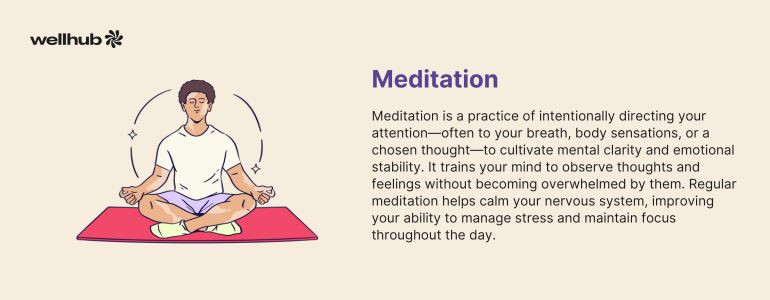How to Build a Meditation Practice: Useful Tips with Real-Life Benefits
Last Updated May 8, 2025

Your brain’s juggling a million tabs, and they all feel urgent. Sound familiar?
When your mind runs nonstop, it’s easy to spiral into stress. But there’s a powerful tool that can bring instant calm—no fancy gear, no complicated steps, and zero experience required. Meditation meets you where you are, whether that’s in your office chair, your living room, or just before bed.
Millions have already unlocked its ability to quiet mental noise, build emotional strength, and create clarity in the middle of chaos. And you can, too.
Discover how even a few mindful minutes a day can transform your focus, boost your resilience, and support your health—no matter what life throws your way.
What Is Meditation?

Meditation is a practice that trains your attention and awareness to achieve a more mentally clear and stable state. It’s like giving your busy brain a chance to catch its breath, same as you would after going on a run or playing a basketball game.
Just as physical exercise strengthens your muscles, meditation strengthens your ability to focus and manage stress. And just like there’s no single “right” way to get fit, there are many different types of meditation that can help you find some mental peace in your busy day.
It’s not about “clearing your mind” or sitting cross-legged for hours. It’s about noticing your thoughts without getting tangled in them. And doing it for even a few minutes can create real change in how you feel and function throughout the day. At its core, it’s about intentionally shifting your focus — often to your breath, your body, or a simple phrase — to calm the mind and settle your nervous system.
Common Types of Meditation Practices
Not all meditation looks like sitting cross-legged and chanting “Om.” There are many forms of meditation, and finding the style that clicks with you can make all the difference in building a practice that sticks. Here are some of the most popular types to try:
Breath-focused Meditation
This is one of the simplest and most accessible ways to start meditating. All you do is bring your attention to your breath: the way it moves in through your nose, fills your lungs, and flows back out.
When your thoughts wander (and they will), gently guide your focus back to your breathing. That redirection is the heart of the practice. This basic style of meditation is all about learning how to come back to the present moment again and again, without judgment. It can be done anytime, anywhere, and even just a few deep breaths can help you reset during a busy day.
Body Scan Meditation
Body scan meditation invites you to tune into physical sensations by moving your attention slowly from one part of your body to the next, usually starting at your toes and ending at the top of your head.
As you scan, you might notice tightness in your shoulders, tension in your jaw, or even areas that feel light and relaxed. The goal isn’t to fix anything, but to increase awareness of how your body feels. This kind of meditation can help you relax more deeply, fall asleep faster, or simply reconnect with yourself when you're feeling out of sync.
Guided Meditation
If sitting in silence feels intimidating, guided meditation can be a great entry point. In this style, a teacher or narrator leads you through the session with calming instructions and gentle reminders to stay present.
You might be guided through a visualization, a breathing exercise, or a series of calming affirmations. Many people find guided meditations helpful when their minds feel especially busy or scattered. You can find these sessions in apps like Headspace. Just pop in your headphones and let someone else take the lead.
Mindfulness Meditation
Mindfulness meditation is all about noticing what’s happening in the present moment without trying to change it. That might include your thoughts, emotions, physical sensations, or even the sounds around you.
Think of it like observing clouds drifting across the sky. You don’t chase after them or push them away. You simply watch and let them pass. Over time, this practice can help you respond to stress with more calm and clarity. And the best part? You can do it while you’re washing dishes, walking the dog, or waiting for your next Zoom call to start.
The Top 15 Benefits of Meditation
Meditation is simple, but the effects are profound. Just a few minutes a day can make a measurable difference in how your brain and body function. Backed by research, these 15 benefits show why meditation is one of the most powerful tools for supporting your wellbeing.
- Reduces stress: If you’re feeling like you’re constantly running on fumes, then meditation might be your answer to stress management: Just eight weeks of meditation can cause a significant drop in stress levels, according to a 2022 Cognitive Processing study.
- Eases anxiety: Meditation can help quiet down that mental chatter. Having a mindfulness practice is as effective as the medication escitalopram for treating anxiety disorders, according to a groundbreaking 2023 study from JAMA Psychiatry. That’s right — this simple practice can work as well as prescription drugs.
- Improves focus and concentration: Just 10 minutes of daily meditation can improve your ability to concentrate, as shown in a 2025 study. It’s like strength training for your attention span, where each time you notice your mind wandering and bring it back, you’re doing a mental rep.
- Enhances emotional awareness: Meditation helps you recognize your feelings without being overwhelmed by them. This awareness creates a little space between what you feel and how you act, giving you more of a choice in how you respond.
- Promotes better sleep: Meditation helps improve your sleep quality and reduce insomnia, as shown in a 2023 study from Research, Society, and Development. By calming your racing thoughts, meditation helps your mind understand when it’s time to rest.
- Lowers blood pressure: Your heart will thank you for your meditation practice. A meditation technique developed by Harvard-affiliated Dr. Herbert Benson where you sit with your eyes closed and repeat the same word or sound over and over was found to lower blood pressure, according to a Harvard study.
- Boosts creativity: Meditation might be just what you need to find fresh ideas. Meditating every day can effectively improve creative thinking in adults, according to a 2023 meta-study.
- Increases self-awareness: Meditating lets you take a long, hard look at your mind. Regular practice helps you recognize patterns in your thoughts and behaviors that might otherwise fly under the radar.
- Strengthens immunity: Your immune system works better when you’re less stressed, and meditation is a stress-buster. Even short meditation sessions can provide some much-needed relief to your immune system.
- Enhances emotional health: Regular meditators are more optimistic and grateful. This can directly lead to an overall higher satisfaction with life, as meditating helps you focus on the positive and let go of the negative.
- Improves relationships: Your connections with others tend to get better when you’re less reactive and more present. Meditation helps you listen more attentively and feel more empathy, making your daily interactions much more mindful.
- Reduces symptoms of depression: Meditating is an effective way to reduce symptoms of depression, as found in a 2024 meta-analysis that reviewed 45 different studies showing evidence of its anti-depression powers.
- Helps manage pain: Meditation doesn’t eliminate pain, but it does change how you experience it. By observing painful sensations with curiosity rather than resistance, you can reduce the suffering that comes from mentally fighting what hurts.
- Increases mindfulness: At its core, meditation develops your ability to be present in the moment instead of getting lost in regrets about the past or worries about the future.
- Supports long-term health: Perhaps most impressive is meditation's impact on aging. Consistent meditation practice has been shown to better preserve your telomeres, which are incredibly important for healthier aging, according to an 18-month study.
Why Meditation Supports Daily Wellbeing
Most days are full. Like, really, really full. You’re managing meetings, emails, errands, family, and maybe squeezing in a workout if you can. It adds up. And over time, that constant push can leave you feeling drained.
That’s where meditation comes in. It’s not about clearing your mind perfectly. It’s about giving yourself a few moments to pause and reset. Even a short daily practice can help you feel more grounded, more focused, and more ready for what’s next.
Let’s break down how meditation supports your everyday wellbeing.
It Helps You Stress Less
Meditation taps into your body’s built-in relaxation response, helping you shift out of stress mode and into a calmer state. Harvard researchers found that mindfulness practices—like focused breathing and meditation—can activate brain regions tied to relaxation and awareness, reducing the grip of chronic stress. Over time, this means fewer racing thoughts, less tension in your body, and more space to breathe during the day.
It Boosts Focus and Productivity
Meditation is like strength training for your attention. One study found people using Headspace for just three weeks improved their focus by 14% and reduced mind wandering. That means more clarity, better task-switching, and fewer moments of rereading the same email over and over again.
It Supports Emotional Resilience
When things get tough—whether it's a tense meeting or a hard moment at home—meditation helps you navigate it with more steadiness. Mindfulness training can strengthen your brain’s emotional regulation centers, helping you respond with more compassion and less reactivity, according to research in Biomedicines. The result? You’re more grounded and thoughtful, even when life throws a curveball.
It Improves Sleep
Struggling to fall asleep because your brain won’t slow down? Meditation can help quiet the mental noise. Mindfulness meditation significantly improved sleep quality and reduced insomnia symptoms in adults, according to a study in JAMA Internal Medicine. Practices like body scans or breathwork signal to your brain that it’s safe to rest—making it easier to fall asleep and stay asleep through the night.
It Makes Room for Joy
In a packed schedule, it’s easy to miss the good stuff. Meditation helps you slow down just enough to notice the small moments, like your coffee’s warmth or a kind message from a coworker. As Psychology Today notes, mindfulness practices increase happiness by boosting present-moment awareness and deepening appreciation for life’s everyday joys.
How to Start Meditating (Step-by-Step)
Starting a meditation practice is much simpler than most people think. You don’t need special equipment, years of training, hours of free time, or a guru. You don’t even need a gym membership! Even five minutes a day can create incredible benefits in your life.
Step 1: Choose a Time and Place That Works for You
Find a relatively quiet spot where you can be left alone for a few minutes. This might be a corner of your bedroom or even a shaded spot in your office garden. Find a place that feels relatively peaceful.
Set aside a specific time of day when you’ll actually stick with it. Many people succeed with morning meditations before the day’s demands take over, while others prefer an evening wind-down.
Step 2: Get Comfortable and Start With the Breath
Sit in a position that feels stable and comfortable. This could be cross-legged on the floor or even lying down if you can stay awake. The goal of meditation is to be alert yet relaxed.
Close your eyes or lower your gaze, and bring your attention to your breathing. Notice the natural rhythm of a deep breath without trying to change it. Feel the sensation of air moving in and out of your body, and gently bring your focus back to your breath when your focus drifts off.
Step 3: Handle Distractions With Compassion
Your mind will wander, but that’s just how the mind works. Each time you notice you’ve gotten carried away by thoughts, simply acknowledge it without judgment and return to your breath.
Tips for Building a Consistent Meditation Habit
Like any healthy habit, meditation works best when it becomes a regular part of your routine. Here are some practical strategies that can help you help you make meditation stick:
- Use technology to your advantage: Meditation apps like Headspace have guided sessions for all experience levels and can track your progress.
- Start ridiculously small: Just one or two minutes a day is good enough at first if five seems daunting. A meditation habit that’s so easy you can’t say no is more likely to last than an ambitious plan.
- Create environmental cues: Keep a meditation cushion visible in your room or set your meditation app on your home screen.
- Be kind to yourself when you miss a day: Perfection isn’t the goal, and harsh self-criticism about missed sessions creates unnecessary stress. Just begin again the next day without judgment.
Meditation, Daily Life, and Finding What Works for You
Meditation doesn’t have to mean long sessions or perfect silence. A few minutes of mindful breathing can shift your mindset, lower stress, and help you feel more grounded, even on your busiest days.
When you find a rhythm that works for you, meditation becomes more than a habit. It becomes a tool to support your emotional health and mental wellbeing. Wellhub gives you access to guided meditations, breathing exercises, and mindfulness apps that make it easier to stay consistent.
You might already have access to Wellhub through your employee benefits. Check here to see if you’re eligible and explore meditation tools that fit your life. If your company doesn’t offer Wellhub yet, start a petition to bring these wellbeing resources to your workplace.

Want Wellhub at your company? Start a petition.
It’s completely confidential! Just follow a few steps and we'll create your official company petition page.
References:
- Black, D. S., O’Reilly, G. A., Olmstead, R., Breen, E. C., & Irwin, M. R. (2015). Mindfulness meditation and improvement in sleep quality and daytime impairment among older adults with sleep disturbances. JAMA Internal Medicine, 175(4), 494. https://doi.org/10.1001/jamainternmed.2014.8081
- Calderone, A., Latella, D., Impellizzeri, F., De Pasquale, P., Famà, F., Quartarone, A., & Calabrò, R. S. (2024). Neurobiological Changes Induced by Mindfulness and Meditation: A Systematic review. Biomedicines, 12(11), 2613. https://doi.org/10.3390/biomedicines12112613
- Greenberg, M., PhD. (2020, January 28). Research shows it’s not just neutral observation. Psychology Today. https://www.psychologytoday.com/us/blog/the-mindful-self-express/202001/the-surprising-reason-mindfulness-makes-you-happier?utm_source=chatgpt.comGobbo, M. M., Uehara, G. M., Ribeiro, M. E. S. F., Bucker, R. B., Nascente, G. J. L., Esteves, H. M. D., Miranda, L. F. do C., Guimarães, A. L. T. L. V., & Carvalhaes, V. D. (2023). Meditation and sleep quality: integrative review. Research, Society and Development, 12(2), e19312240186. https://doi.org/10.33448/rsd-v12i2.40186
- The Harvard Gazette. (2018, July 24). Mindfulness meditation and relaxation response affect brain differently. Harvard Gazette. https://news.harvard.edu/gazette/story/2018/06/mindfulness-meditation-and-relaxation-response-affect-brain-differently/?utm_source=chatgpt.comHarvard Health Publishing. (2020, June 14). Meditation and a relaxation technique to lower blood pressure. Harvard Health. https://www.health.harvard.edu/heart-health/meditation-and-a-relaxation-technique-to-lower-blood-pressure
- Headspace. (n.d.). Boosting Productivity at Work: How Mindfulness Training Helps. National Institutes of Health. https://wellnessatnih.ors.od.nih.gov/Documents/Boosting%20Productivity%20at%20Work%20How%20Mindfulness%20Training%20Helps%20%28002%29.pdf
- Hoge, E. A., Bui, E., Mete, M., Dutton, M. A., Baker, A. W., & Simon, N. M. (2022). Mindfulness-Based Stress Reduction vs Escitalopram for the Treatment of Adults With Anxiety Disorders: A Randomized Clinical Trial. JAMA Psychiatry, 80(1), 13–21. https://doi.org/10.1001/jamapsychiatry.2022.3679
- Horrillo Álvarez, B., Marín Martín, C., Rodríguez Abuín, M., & Orio Ortiz, L. (2022). Short mindfulness meditation training: does it really reduce perceived stress? Cognitive Processing, 23(4), 559–568. https://doi.org/10.1007/s10339-022-01108-y
- Hughes, Z., Ball, L. J., Richardson, C., & Judge, J. (2023). A meta-analytical review of the impact of mindfulness on creativity: Framing current lines of research and defining moderator variables. Psychonomic Bulletin & Review. https://doi.org/10.3758/s13423-023-02327-w
- Kaliman, P., Álvarez-López, M. J., Lehodey, A., Fernández, D., Chocat, A., Schlosser, M., de La Sayette, V., Vivien, D., Marchant, N. L., Chételat, G., Lutz, A., Poisnel, G., André, C., Lugo, S. B., Batchelor, M., Beaugonin, A., Champetier, P., Chauveau, L., Chételat, G., & Chocat, A. (2025). Effect of an 18-Month Meditation Training on Telomeres in Older Adults: A Secondary Analysis of the Age-Well Randomized Controlled Trial. Biological Psychiatry Global Open Science, 5(1), 100398. https://doi.org/10.1016/j.bpsgos.2024.100398
- Reangsing, C., Lauderman, C., & Schneider, J. K. (2022). Effects of Mindfulness Meditation Intervention on Depressive Symptoms in Emerging Adults: A Systematic Review and Meta-Analysis. Journal of Integrative and Complementary Medicine, 28(1), 6–24. https://doi.org/10.1089/jicm.2021.0036
- Zhang, R. (2018). The Effect of Meditation on Concentration Level and Cognitive Performance. Global Journal of Health Science, 11(1), 134. https://doi.org/10.5539/gjhs.v11n1p134
Category
Share

The Wellhub Editorial Team empowers HR leaders to support worker wellbeing. Our original research, trend analyses, and helpful how-tos provide the tools they need to improve workforce wellness in today's fast-shifting professional landscape.
Subscribe
Our weekly newsletter is your source of education and inspiration to help you create a corporate wellness program that actually matters.
Subscribe
Our weekly newsletter is your source of education and inspiration to help you create a corporate wellness program that actually matters.
You May Also Like

Women Gym Owners And Founders To Celebrate This International Women’s Day | Wellhub
For International Women’s Day, we put the spotlight on women-owned and founded gyms across the country that deserve a moment to shine.

Black-Owned And Founded Fitness And Wellness Businesses To Support
Check out these black-owned and founded gyms, studios, and fitness and wellness companies and the many ways you can support them.

5 Fun Workouts To Spice Up Your Fitness Routine | Wellhub
Here are five fun workouts and studios to shake up your circuit and keep your fitness routine from falling into an exercise rut.